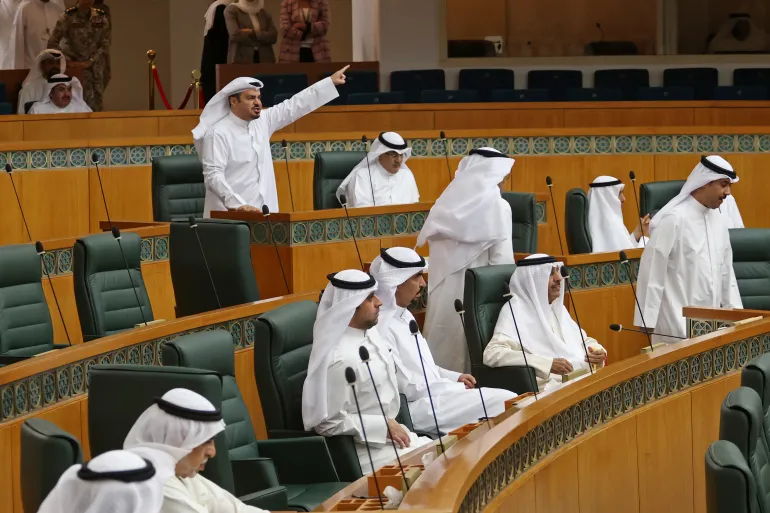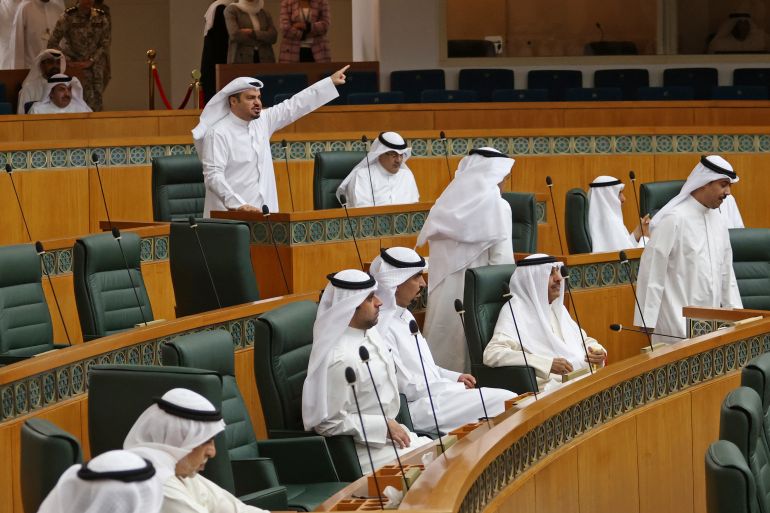Kuwait’s political crisis leaves opposition waiting for new era

A new government in Kuwait, but an old parliament – and one that has returned in complicated circumstances.

Kuwait City, Kuwait – Yet another new government in Kuwait – the country’s seventh in three years.
On Sunday, in an effort to alleviate seemingly continuous political deadlock, a royal decree appointed a new Kuwaiti government, headed by Prime Minister Sheikh Ahmad Nawaf Al-Ahmad Al-Sabah.
Last June, a previous Kuwaiti royal decree dissolved the country’s parliament and called for new elections, with the aim of ushering in a “new era” in the Gulf country as it contended with political instability.
However, last month – and after prolonged friction between the government and a parliament that was only elected in September – the legislative body was dissolved by Kuwait’s Constitutional Court, and replaced by the very parliament that had preceded it.
The reason given in the ruling was non-cooperation from the government, but the decision had surprised many in Kuwait, particularly considering its divergence from the royal decree, which had been issued just nine months prior.
But, despite the situation, there has been no comment from either the Kuwaiti royal court or the country’s government on the issue since the ruling was issued on March 19.
“There is no easy solution out of this dilemma, which was largely created by a surprising governmental resignation in January,” said Luai Allarakia, a visiting political science professor at the University of Richmond, calling the court’s decision “unnecessary and confrontational”.
A gradual lack of cooperation from the previous government during assembly sessions ahead of the new year led to the resignation of the cabinet in January, eventually prompting the judicial branch’s recent ruling.
In a country with the most active parliament in the Gulf region, the ruling could also be interpreted as an attack on Kuwait’s opposition, after the majority of seats in September’s elections went to opposition members.
Allarakia, who focuses on Gulf legislatures, argues that the decision has “plunged Kuwait into a constitutional crisis, [putting] opposition members in the uncomfortable position of criticising the court”.
Kuwait’s opposition treads carefully around criticism directed at both the royal court and the country’s judiciary.
On the deepening deadlock, Allarakia points to a “very likely return to square one”, where an ineffective assembly leads to another round of elections, regardless of the possible routes ahead, he said.
Allarakia outlined two possible scenarios for where Kuwaiti politics goes next. The first would see new elections called, particularly given the newly reinstated parliament’s unpopularity. The second would involve the dissolution of the reinstated assembly, either as a result of opposition pressure or another royal decree. But in either of the two scenarios, Allarakia says, “recurring deadlock remains a real possibility”, if there are no guarantees of cooperation from the executive branch.
Constitutional deadlock
The 2022 elections saw the return to parliament of several opposition figures who had boycotted previous assemblies after they lost their seats following a previous court ruling in 2012, which had similarly annulled the parliament, declaring it constitutionally invalid.
Then, much like now, gridlock between parliament and the government was at the root of the political instability.
Following the elections, Kuwait’s emir appointed his son, Sheikh Ahmad Nawaf Al-Ahmad Al-Sabah, as prime minister. In less than six months, he had been forced to appoint a new government, after the parliament disapproved of his initial selection.
Members of parliament then presented a populist loan forgiveness bill. Disapproval from ministers and a failed attempt at compromise ultimately lead to deadlock in the national assembly.
Given that situation, there are many voices in Kuwait’s political establishment who argue that there should be no going back on the court’s decision to annul the previous parliament.
Yaqoub Al-Sane, a former minister of justice, is one of those.
“A statesman takes upon themselves the responsibilities presented by his given political environment,” Al-Sane told Al Jazeera. “There is a road map presented by the court and diverting from it will lead to its [the national assembly’s] dissolution again. This shouldn’t be an acceptable outcome for the government or the opposition.”
Mohammed Alfahad, a professor of constitutional law at the Kuwait International Law School, argues that, beyond the legal discrepancies in the constitutional court’s ruling, there is a more immediate political concern: public disapproval of the returning parliament.
Like many in Kuwait across the political spectrum, Alfahad believes the “2020 assembly … enjoys no popular support”, and should be dissolved, with new elections held. Alfahad added that what he termed a “mass political depression” caused by a return to an unwanted status quo may lead to “a strong public disinterest in the electoral process”.
Last September’s elections had seen a hopeful population driven to the polls with a royal promise for Kuwait to enter a national stage focused on its future.
The election results led to a majority opposition presence, added two women back to the legislature and dropped a medley of establishment politicians from the previous assembly.
Now those opposition gains, won off the back of the vote, are gone – and with them, the new era that had been promised.
“There needs to be a new election as soon as possible,” Alfahad said. “And the 2020 assembly must be dissolved – as its dissolution removes the dangers of the current political crisis.”







